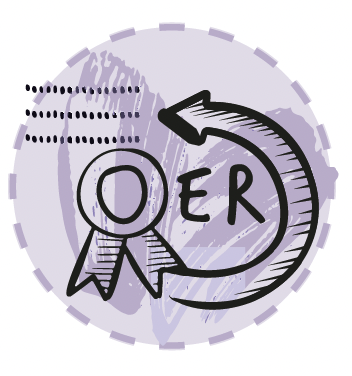#12 OER at TU Graz
OER certification and publication of your own OER
TU Graz is committed to open educational resources, as described in the OER Policy (document available in German). In the spirit of open access to education, staff at TU Graz is also invited to create, reuse and share open educational resources (OER) with colleagues.
Teachers at TU Graz can benefit from the in-house training “Online course: Using, Creating and Publishing Open Educational Resources“ to learn more about the topic of OER and also to obtain the certificate “OER Practitioner“ by the Forum New Media in Teaching Austria (fnma). TU Graz offers an OER repository for quick and easy publication of your own OER. A specially developed plugin in the TeachCenter also enables teachers at TU Graz to publish OER directly from the TeachCenter.

For more information about OER, see TELucation article #02 OER
OER certification for teachers
In order to ensure the know-how for OER creation at Austrian universities, the Forum New Media in Teaching Austria (fnma) awards the certificate “OER Practitioner“ for staff of higher education institutions if its requirements are met. The corresponding OER course “Online Course: Using, Creating and Publishing Open Educational Resources“ can be completed at TU Graz as part of the in-house training. The OER in-house training has a scope of 1 ECTS credit (25 working hours) and consists of
- synchronous course units, bookable via the in-house training
- successful participation in the online course "Using and creating OER" on iMooX.at (available in German)
- a practical part in which at least three own OER are created, correctly licensed and published
After the training, participants will know how to find openly licensed educational resources (OER), how to create their own OER, and how to revise and publish content from others.

Are you interested in becoming an OER-certified teacher? Register for the in-house training (for the synchronous course units) and on iMooX.at (for the Using and Creating OER course)!
Publishing OER: TeachCenter plugin and OER repository

The prerequisite for access to the TeachCenter OER plugin and the OER repository is the “OER Practitioner“ certificate by fnma.
Publication via the TeachCenter plugin
The TeachCenter OER plugin was developed as part of the “Open Education Austria Advanced“ project (2020 - 2024). It is suitable for publishing openly licensed educational content from TeachCenter courses.
Once per semester, teachers can automatically have content with open licences that has been made available in the TeachCenter transferred to OERhub.at, the directory of Austrian OER from universities. The metadata of your files can then be searched there. This makes it easy for you to share your OER with interested teachers at other Austrian universities and beyond.

The plugin has been published on GitHub with an open source licence and is therefore also available to other higher education institutions.
The aim of the plugin is to make publishing as easy as possible for teachers. Teachers only need to upload the files in their TeachCenter courses before the transfer date and add any missing metadata. To save you time, most of the metadata is automatically pre-filled.
The plugin will be activated for you after completing the in-house training on OER, when you also receive your “OER Practitioner“ certificate.


A step-by-step guide for the plugin is available on this website.
Publication via the OER repository
The OER repository of TU Graz is suitable for publishing open educational resources that do not belong to any TeachCenter course (e.g. presentations about publications, general documents) or if you want to immediately publish your files or create a DOI for them.
OER published in the OER repository are transferred to the OERhub.at directly after your upload. The metadata of the files are then searchable for all interested teachers and others in the OERhub.at.
The OER repository can be used by anyone with an OER certification and a TU Graz (basic) account, regardless of your higher education institution.

A step-by-step guide for the repository is available on this website.

If you would like to upload files to the OER repository, please send your OER certificate and a request for activating your account to telucation@tugraz.at
Further reading:
Schön, Sandra, Martin Ebner, Gerhard Brandhofer, Elfriede Berger, Ortrun Gröblinger, Tanja Jadin, Michael Kopp, Hans-Peter Steinbacher. „OER-Zertifikate für Lehrende und Hochschulen. Kompetenzen und Aktivitäten sichtbar machen.“ In Lehrentwicklung by Openness – Open Educational Resources im Hochschulkontext, Eds. Cinzia Gabellini et al., 29-32. Luzern: Pädagogische Hochschule Luzern, 2021. https://doi.org/10.5281/zenodo.5004445.
Schön, Sandra, Martin Ebner, Elfriede Berger, Gerhard Brandhofer, Sarah Edelsbrunner, Ortrun Gröblinger, Claudia Hackl, Tanja Jadin, Michael Kopp, Kristina Neuböck, Judith Proinger, Alexander Schmölz, Hans-Peter Steinbacher. „Development of an Austrian OER Certification for Higher Education Institutions and Their Employees.“ In Distributed Learning Ecosystems, Eds. D. Otto et al., 9. Wiesbaden: Springer VS, 2023. doi:10.1007/978-3-658-38703-7_9.
Ladurner, Christoph, Christian Ortner, Karin Lach, Martin Ebner, Maria Haas, Markus Ebner, Raman Ganguly, Sandra Schön. „The Development and Implementation of Missing Tools and Procedures at the Interface of a University’s Learning Management System, its OER Repository and the Austrian OER Referatory.“ International Journal of Open Educational Resources (IJOER) 3, no. 2 (Fall 2020 Winter 2021). URL: https://ijoer. scholasticahq.com/article/25065-the-development-and-implementationof-missing-tools-and-procedures-at-the-interface-of-a-university-slearning-management-system-its-oer-repository-a
Ladurner, Christoph, Christian Ortner, Karin Lach, Martin Ebner, Maria Haas, Markus Ebner, Raman Ganguly, Sandra Schön. „Entwicklung und Implementierung eines Plug-Ins und von APIs für offene Bildungsressourcen (OER).“ In INFORMATIK 2020, Eds. R. H. Reussner, A. Koziolek, and R. Heinrich, 453-465. Gesellschaft für Informatik, Bonn: Gesellschaft für Informatik, 2021. doi:10.18420/inf2020_42.

 TU Graz Educational Technology
TU Graz Educational Technology